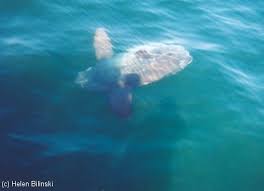
'Sup.
If you are at all familiar with Japanese popular culture, you have seen this fish floating around. It is called, variously, Mola mola, ocean sunfish, mambo, "moon fish" in various languages and "just head" or '"swimming head" in others. That last one described this tropical fish pretty well: It's a giant head with fins.
Headfish is just a head.
The sunfish has almost no spine or tail to speak of, making all of those head jokes more than a little accurate. Instead of true tails, ocean sunfish have pseudo-tails called the clavus. As larvae, they have fins, tails and spines like their more infamous relatives, the pufferfish:

Now THAT is a sunfish!
It is also huge -a single adult sunfish can get over 6 feet long and weigh over a ton. A sunfish can also be up to ten feet from fin tip to fin tip. Ocean sunfish hold the record for the world's heaviest bony fish, even though most of that weight is cartilage. (For those curious, whale sharks are entirely cartilaginous - despite being huge, they have no bones!) They are harmless to swimmers, but, because they get so darn big, can be dangerous to boats.

Ocean sunfish have very odd skin. Not only is it rough like a shark's (which has denticles, not scales), it is also coated in mucus. It often shines in the sunlight, giving it all the pretty celestial names above. Its title of "mola," "millstone," comes from the denticles.

Mola also love basking; their skin is often riddled with parasites.
Sunfish eat jellyfish, Man o' Wars, salps and other such gooey things that float around in the ocean.( This is one of those species that thinks your plastic bags might be jellyfish, by the way, so please do not litter.) It is, in turn, eaten by orcas, sharks, humans (nobody really knows whether the ocean sunfish is poisonous or not) and sea lions. Sea lions are out and out sadistic to sunfish; they hunt the fish for sport, tearing off the fins and leaving the sunfish to die at the bottom of the ocean.

All I wanted to do was eat gummi bears...
As one would imagine, sunfish are hard to find in captivity. They, along with whale sharks, are particularly popular in Asian aquaria. The shot at the top of the page is from the Monterey Bay aquarium in California. They require a lot of space, rounded, deep tanks, and, if housed with other, more aggressive fish, hand-feeding. As more and more sunfish are accidentally fished out of the ocean, these captive specimens will become more and more valuable. (As of right now, there is no certainty of the sunfish's conservation status, but at least the captive sunfish aren't eating plastic bags.)

No comments:
Post a Comment